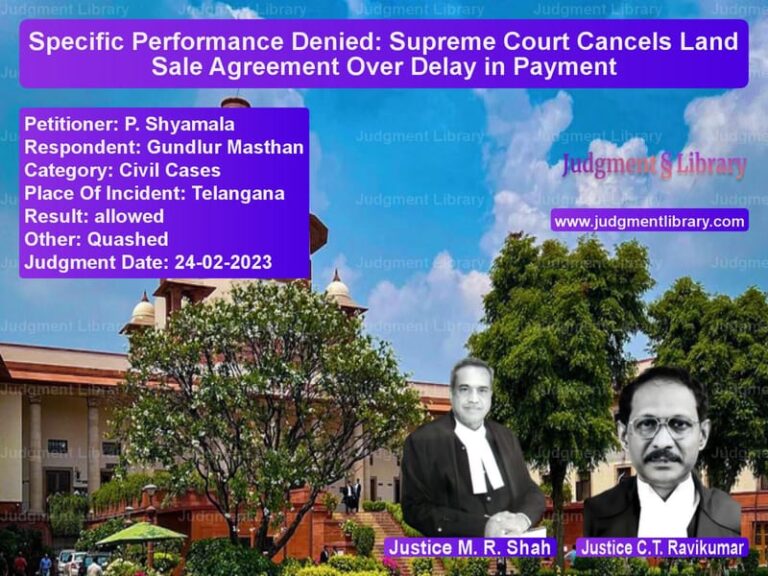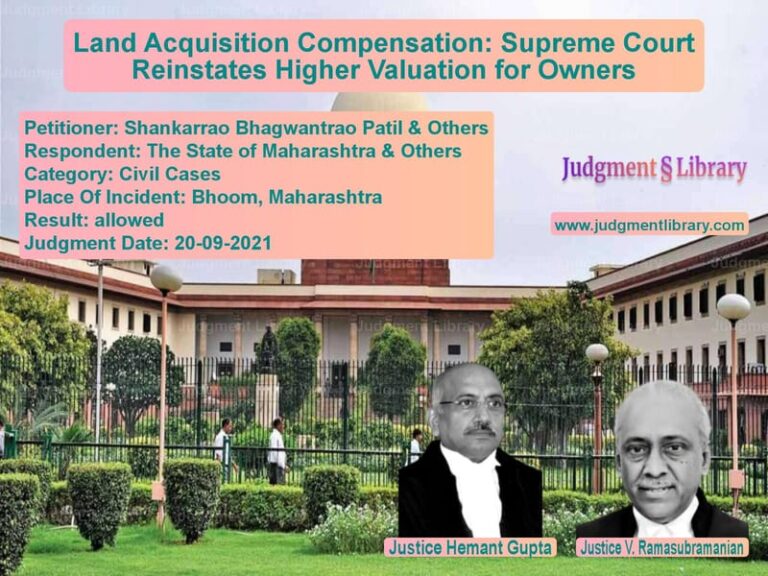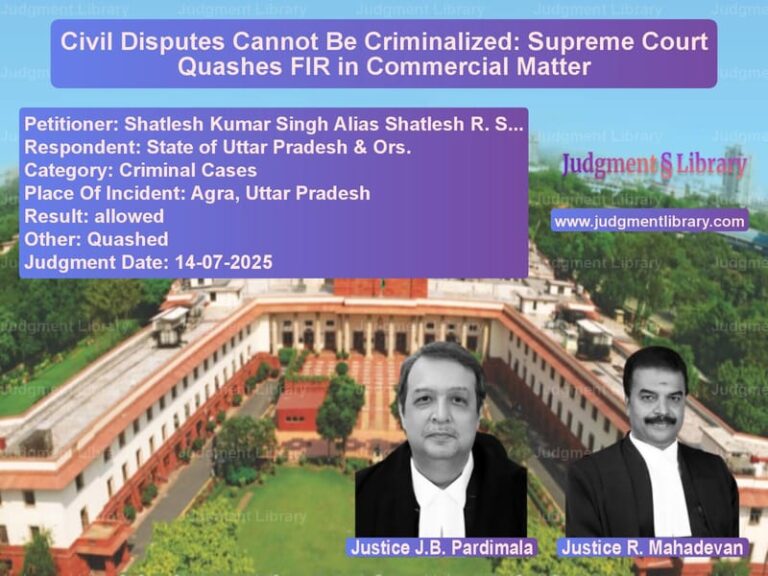SC/ST Act Charges Quashed in Criminal Case Over Political Rivalry: Supreme Court Ruling
The Supreme Court of India recently ruled on an appeal in Shashikant Sharma & Ors. v. State of Uttar Pradesh & Anr., addressing the applicability of Section 3(2)(v) of the Scheduled Castes and Scheduled Tribes (Prevention of Atrocities) Act, 1989. The judgment examined whether an alleged firearm attack during a politically motivated dispute justified the invocation of the SC/ST Act, ultimately quashing those charges while allowing the trial to proceed for IPC offenses.
Background of the Case
The case originated from an alleged attack in the state of Uttar Pradesh. The prosecution claimed that the accused, including Vinod Upadhyay, fired a gunshot at Rinku Thakur, while another witness, Virender Kumar, was subjected to caste-based abuse. The police charged the accused under Sections 147, 148, 149, 307, 323, and 504 of the Indian Penal Code (IPC) and Section 3(2)(v) of the SC/ST Act.
The appellants moved the Special Judge (SC/ST Act), Hathras, seeking discharge from all charges. Their application was rejected on March 14, 2023. The Allahabad High Court later dismissed their appeal on April 6, 2023, prompting the present appeal before the Supreme Court.
Legal Issues Raised
- Did the allegations warrant the framing of charges under Section 3(2)(v) of the SC/ST Act?
- Were the IPC offenses, particularly Section 307 (attempt to murder), prima facie made out?
- Was there sufficient evidence that the accused knew the victim belonged to the SC community?
- Could the case be transferred from a Special Court to a Sessions Court?
Arguments of the Appellants
- The prosecution failed to prove that the accused committed an offense under the IPC with knowledge that the victim was a member of the SC community.
- The main allegation revolved around a gunshot injury to Rinku Thakur, but his medical examination revealed no gunshot wounds.
- Virender Kumar’s claim of caste-based abuse was raised only after the alleged shooting, making it an afterthought.
- The case was politically motivated, registered as a counterblast to a murder case involving a member of the complainant party.
- The investigation was manipulated under political influence, and even the filing of the FIR required court intervention.
Arguments of the Respondents
- The accused launched an unprovoked attack on the complainant party due to political rivalry.
- The prosecution’s allegations were corroborated by witness statements under Section 161 of the CrPC.
- The accused, after firing the gunshot, hurled caste-based abuses at Virender Kumar, making the SC/ST Act applicable.
- The Special Judge’s order was justified, as at the stage of framing charges, only a prima facie case needed to be established.
Supreme Court’s Observations
1. Section 3(2)(v) SC/ST Act: Essential Ingredients
The Court noted that for an offense to fall under Section 3(2)(v) of the SC/ST Act, the accused must:
- Commit an offense under the IPC punishable with imprisonment of 10 years or more.
- Do so against an SC/ST member, knowing that the victim belongs to such a community.
The Court found that these elements were not satisfied, stating:
“From the admitted case set up by the prosecution, there is no such allegation that an IPC offense punishable with imprisonment of 10 years or more was committed by an upper-caste accused against a Scheduled Caste victim, knowing that such person belonged to the said community.”
2. Medical Evidence Contradicts Attempt to Murder Allegation
While the prosecution alleged that Rinku Thakur sustained a gunshot wound, his medical report showed only a boil/abscess on his thigh. The Court noted:
“When the medical evidence does not support the prosecution’s allegations, it raises serious doubts about the correctness of the charges framed.”
3. Political Rivalry as the Motive
The Court acknowledged that the case had political undertones, as the complainant party was canvassing for an opposing political faction. It noted:
“The FIR was registered with great difficulty due to political interference, and the prosecution’s primary focus was on the alleged attack on Rinku Thakur rather than any caste-based offense.”
4. Framing of Charges and Burden of Proof
The Court emphasized that at the stage of framing charges, a meticulous examination of evidence is unnecessary. However, it clarified:
“If the admitted allegations of the prosecution do not establish the essential ingredients of an offense, the Court is not obligated to frame charges under such provisions.”
Final Judgment
- The Supreme Court quashed the charges under Section 3(2)(v) of the SC/ST Act.
- The accused would still face trial for IPC offenses, including Sections 147, 148, 149, 307, 323, and 504.
- Since the SC/ST Act charges were dropped, the case was transferred from the Special Court to the Sessions Court.
- The non-bailable warrants issued against the accused were cancelled, and the bonds they executed in May 2023 remained in effect.
Key Takeaways
1. Mere Caste-Based Abuses Do Not Always Attract SC/ST Act
The ruling clarifies that for Section 3(2)(v) of the SC/ST Act to apply, the accused must have committed a serious IPC offense against an SC/ST member, knowing their caste identity.
2. Political Rivalry Can Influence Criminal Cases
Courts must scrutinize allegations in politically charged cases to ensure fairness.
3. Medical Evidence Plays a Crucial Role
When medical reports contradict key prosecution claims, courts may reconsider the validity of charges.
4. Special Court Jurisdiction Depends on SC/ST Act Charges
With the SC/ST Act charges quashed, the case was transferred to a Sessions Court, reaffirming that Special Courts handle only designated cases under the Act.
Conclusion
The Supreme Court’s judgment underscores the importance of correctly applying special laws like the SC/ST Act. It ensures that caste-based offenses are prosecuted appropriately while preventing misuse of the law for political or personal vendettas. This ruling provides clarity on the required legal thresholds for invoking special protections under the SC/ST Act.
Petitioner Name: Shashikant Sharma & Others.Respondent Name: State of Uttar Pradesh & Another.Judgment By: Justice Pamidighantam Sri Narasimha, Justice Sandeep Mehta.Place Of Incident: Uttar Pradesh.Judgment Date: 30-11-2023.
Don’t miss out on the full details! Download the complete judgment in PDF format below and gain valuable insights instantly!
Download Judgment: shashikant-sharma-&-vs-state-of-uttar-prade-supreme-court-of-india-judgment-dated-30-11-2023.pdf
Directly Download Judgment: Directly download this Judgment
See all petitions in SC/ST Act Case
See all petitions in Bail and Anticipatory Bail
See all petitions in Judgment by P.S. Narasimha
See all petitions in Judgment by Sandeep Mehta
See all petitions in partially allowed
See all petitions in Quashed
See all petitions in supreme court of India judgments November 2023
See all petitions in 2023 judgments
See all posts in Criminal Cases Category
See all allowed petitions in Criminal Cases Category
See all Dismissed petitions in Criminal Cases Category
See all partially allowed petitions in Criminal Cases Category







